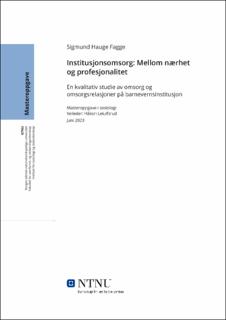Institusjonsomsorg: Mellom nærhet og profesjonalitet
Master thesis
Permanent lenke
https://hdl.handle.net/11250/3081854Utgivelsesdato
2023Metadata
Vis full innførselSamlinger
Sammendrag
I denne kvalitative studien har jeg som mål å få innsikt i hva som kjennetegner omsorg ogomsorgsrelasjoner på barnevernsinstitusjoner. For å oppnå denne innsikten har jeggjennomført kvalitative dybdeintervjuer med fire barnevernsansatte, og sju ungdommer sombor – eller har bodd – på barnevernsinstitusjon. Gjennom et teoretisk rammeverk som tar forseg sosiale bånd og velferdsdimensjoner ser jeg nærmere på hvordan institusjonsomsorg kanforstås. I forlengelsen av dette diskuterer jeg hvordan omsorgsutøvelsen som foregår påbarnevernsinstitusjonen bidrar til å legge til rette for personlig utvikling i perioden hvorungdommene bor på institusjonen, samt legger grunnlaget for livsmestring i livet etterinstitusjonsoppholdet. Med utgangspunkt i interaksjonistiske perspektiver på identifisering ogstigmatisering argumenterer jeg for at de ungdommene som opplever en slik utvikling – foreksempel ved å åpne seg opp for nærhet og gjensidighet i relasjoner – i større gradidentifiserer seg med en institusjonsidentitet enn de som ikke opplever en slik utvikling.I arbeidet med analysen av datamaterialet har jeg benyttet meg av en abduktiv tilnærminghvor noen teoretiske perspektiver har vært inkludert i utforming av problemstillinger ogintervjuguider, men hvor jeg også har ønsket å opprettholde en utforskende tilnærming tildatamaterialet, og inkludert nye teoretiske perspektiver underveis i prosessen. Dennepragmatiske inngangen har gjort det mulig å analysere oppgavens datagrunnlag ut ifra et bredtspekter av sosiologiske perspektiver. Analysen er strukturert ut ifra seks sentrale temaer: (1)Forståelsen av omsorg, (2) forståelsen av omsorgsrelasjoner, (3) grensene mellom privateomsorgsrelasjoner og institusjonsomsorg, (4) ungdommenes utvikling og målsettinger i livet,(5) institusjonsidentitet, og (6) sammenhengen mellom de ansattes utdanning og evne til åutøve omsorg.Jeg kommer frem til at det sentrale kjennetegnet på institusjonsomsorg – altsåomsorgsrelasjonene mellom ungdommer og ansatte på barnevernsinstitusjon – er at debefinner seg i et krysningspunkt mellom nærhet og profesjonalitet. Ungdommene respondererdårlig på ansatte som oppfattes som «for A4», og legger vekt på nærhet og gjensidighet når debeskriver gode relasjoner til de ansatte. For de ansatte representerer omsorgsrelasjonene påinstitusjonen en vanskelig balansegang mellom det å vise nærhet, engasjement og innlevelse,og det å opprettholde en profesjonell distanse for å verne om eget privatliv In this qualitative study, my aim is to gain insight into the characteristics of care andcaregiving relationships in child welfare institutions. To achieve this, I have conductedqualitative in-depth interviews with four child welfare professionals and seven young peoplewho live or have lived in child welfare institutions. Using a theoretical framework thataddresses social bonds and dimensions of welfare, I examine how institutional care can beunderstood. Furthermore, I discuss how the provision of care in child welfare institutionscontributes to facilitating personal development during the period when young people residein the institution and lays the foundation for coping with life after their stay. Drawing oninteractionist perspectives on identification and stigmatization, I argue that young people whoexperience such development—for example, by opening up to closeness and reciprocity inrelationships—to a greater extent identify with an institutional identity than those who do notexperience such development.In analysing the data, I have adopted an abductive approach where certain theoreticalperspectives have influenced the formulation of research questions and interview guides.However, I have also maintained an exploratory approach to the data and incorporated newtheoretical perspectives throughout the process. This pragmatic approach has allowed foranalysis of the data from a wide range of sociological perspectives. The analysis is structuredaround six central themes: (1) understanding care, (2) understanding caregiving relationships,(3) the boundaries between private caregiving relationships and institutional care, (4) theyouths development and life goals, (5) institutional identity, and (6) the connection betweenthe employees' education and their ability to provide care.I find that the central characteristic of institutional care—meaning the caregiving relationshipsbetween youth and staff in child welfare institutions—is that they exist at the intersection ofcloseness and professionalism. The youth respond poorly to staff members they perceive as"too standardized," and they emphasize closeness and reciprocity when describing goodrelationships with the staff. For the employees, the caregiving relationships in the institutionrepresent a difficult balance between showing closeness, engagement, and empathy, andmaintaining a professional distance to protect their own personal lives.
